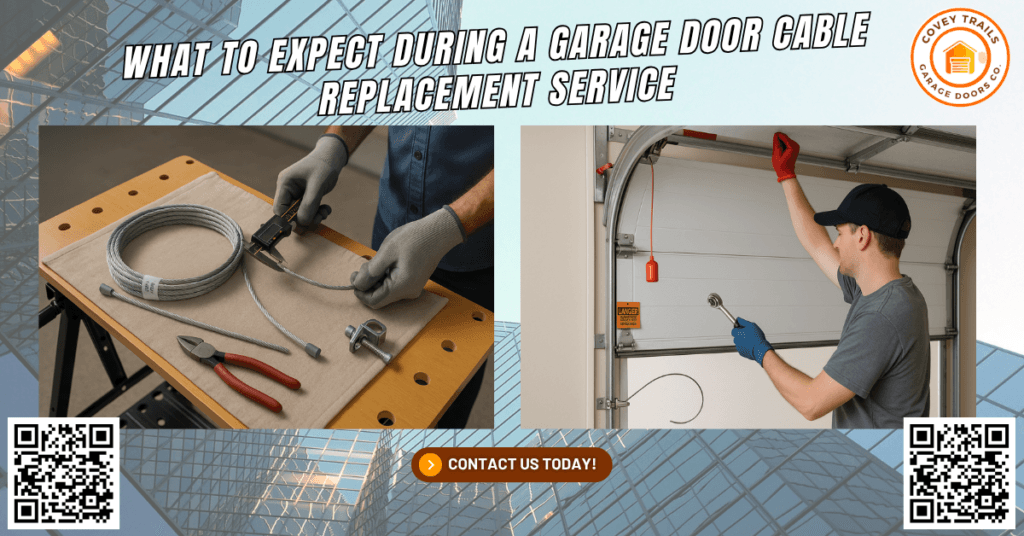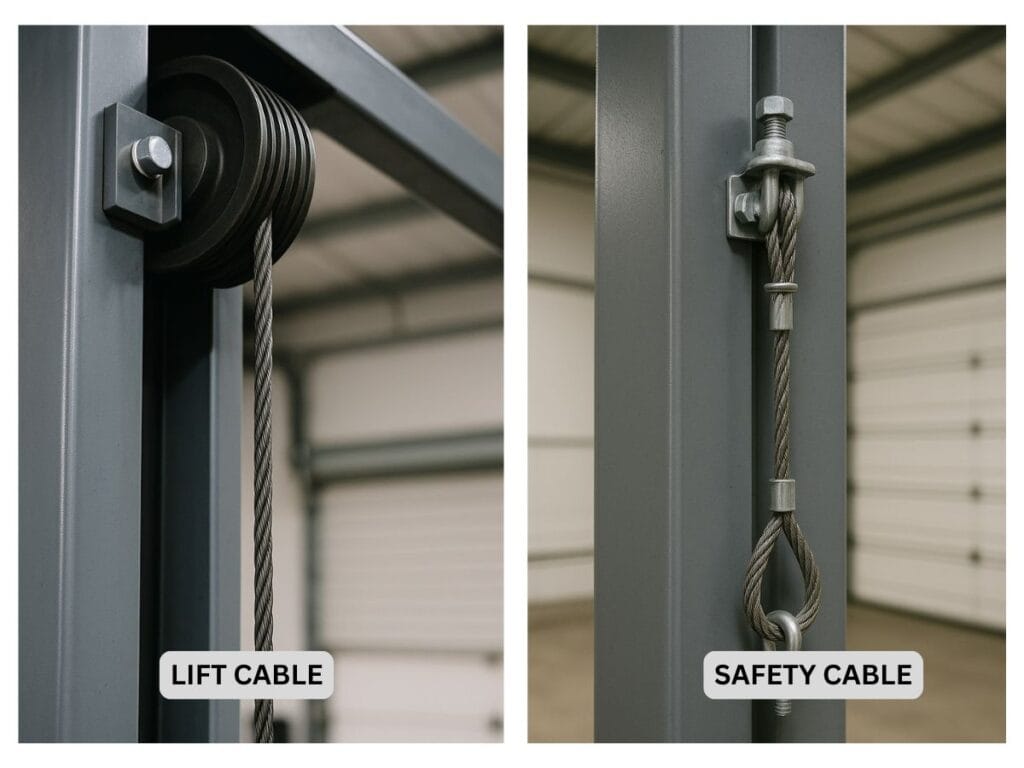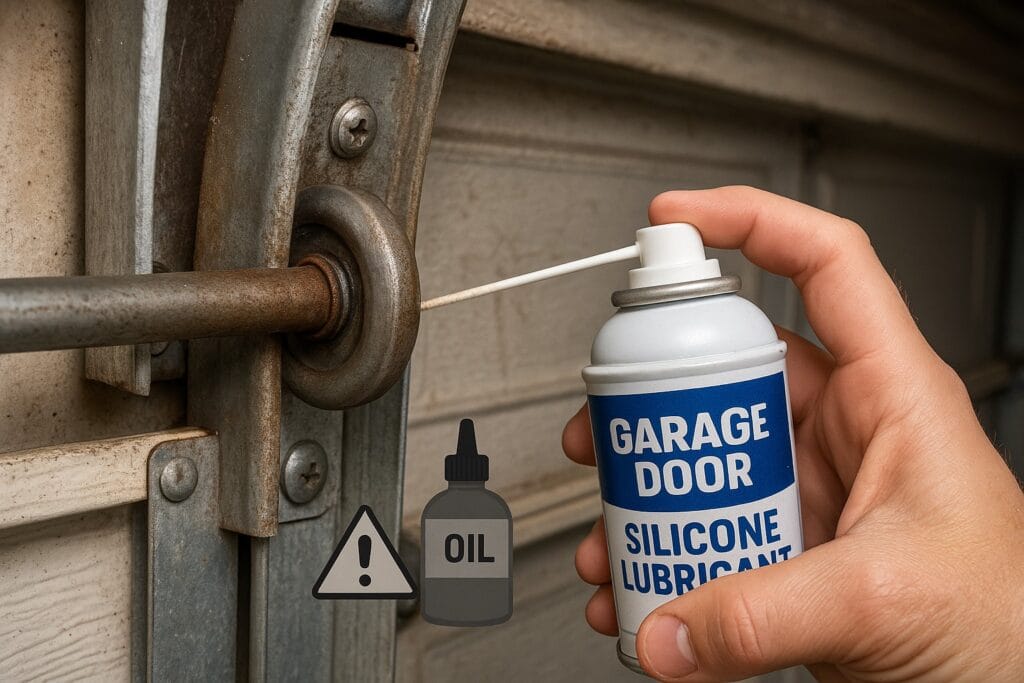What to Expect During a Garage Door Cable Replacement Service

It was a calm Saturday morning in Richmond, TX, when a homeowner called Covey Trails Garage Doors Co. in distress. Their garage door had stopped mid-track, hanging unevenly and making loud creaking noises. Upon arrival, our technician found a snapped garage door cable tangled around the drum and a severely unbalanced garage door. This was a classic example of what happens when garage door cables wear down over time without regular maintenance.
According to industry statistics, garage doors are the largest and heaviest moving parts in most homes, and faulty cables are one of the top three reasons for garage door malfunctions. These cables are under immense spring tension, and when they fail, they can cause significant damage and even serious injury.
That’s why understanding garage door cable replacement is crucial. If you own a home or manage a commercial building with a garage, this comprehensive guide will walk you through the entire process. From spotting early signs of wear to the final safety checks, we’ll break it all down using simple language so even an 8th grader can follow along.
What Are Garage Door Cables and Why Are They So Important?
Garage door cables are strong metal wires, usually made of galvanized steel, that work alongside springs to lift and lower the garage door. These cables are looped around the cable drums located at either end of the torsion tube. Connected to the bottom brackets of the garage door, the cables carry the weight of the door as it opens and closes.
There are two main types of garage door cables:
- Lift Cables: These operate in conjunction with torsion springs to manage the raising and lowering of the garage door. Without these, the springs cannot function effectively.
- Safety Cables: These are typically found in extension spring systems and act as a backup to contain the spring if it breaks, preventing it from causing injury or property damage.

Garage door cables are vital because they handle the weight and movement of the door, ensuring smooth operation and balance. A damaged or frayed cable can put extra strain on your garage door opener, misalign the tracks, or even cause the door to slam shut unexpectedly, posing serious safety risks.
Common Signs That You Need Garage Door Cable Replacement
Recognizing the early signs of cable wear can prevent costly garage door repairs and ensure safe operation. Here are some red flags every homeowner should watch for:
1. Frayed or Corroded Cables
Fraying is a clear sign that your garage door cables are reaching the end of their life. This often appears as loose or broken strands. Over time, environmental factors like moisture and dirt can cause the cables to corrode and lose their strength.
2. Uneven or Crooked Door
When one cable breaks and the other remains intact, your door may become slanted or jammed. This misalignment can damage tracks, rollers, and the door itself. It can also lead to premature wear on other garage door components.
3. Loud Snap or Bang Sound
If you hear a sudden loud noise from the garage, it could be a spring or cable breaking under tension. This is an immediate safety hazard and should be addressed by a professional immediately.
4. Door Won’t Open or Close Completely
A broken cable can jam the system, leaving your door stuck halfway or unable to move at all. This also puts strain on the garage door opener and can reduce its lifespan.
5. Loose or Hanging Cable
If you see a cable hanging near the track, it likely came off the drum or snapped. Do not attempt to fix it yourself. Improper handling can result in further damage or injury.
The Step-by-Step Garage Door Cable Replacement Process
Replacing a garage door cable is a task best left to trained professionals. Garage doors are heavy, and the spring tension involved can be dangerous. Here’s how Covey Trails Garage Doors Co. performs a safe and reliable cable replacement service:
Step 1: Inspection and Diagnosis
Our technician starts with a full inspection of your garage door system. We examine the springs, drums, pulleys, rollers, and opener. We check for other issues like rust, wear, or loose parts. If only one cable is damaged, we still recommend replacing both for consistent tension and long-term reliability.
Step 2: Power Down and Safety Precautions
The garage door opener is disconnected to prevent accidental activation. We wear personal protective equipment (PPE), including gloves and safety glasses. Safety precautions are essential to prevent injury from spring tension or falling parts. This ensures that every task is conducted with the highest standard of safety in mind.
Step 3: Release Spring Tension
Using the right tools, we carefully unwind the torsion springs. This reduces tension on the cables and prevents further damage. Improper handling at this step can lead to serious accidents, including broken bones or lacerations.
Step 4: Remove the Old Cables
We unhook the old cables from the bottom brackets and unwind them from the cable drum. If the old cables are frayed or rusted, we also check the drums and bottom brackets for damage or signs of excessive wear.
Step 5: Install the New Cables
New high-strength steel cables are measured and attached to the bottom brackets. They are routed over the pulley system and wound securely around the cable drum. We ensure proper alignment, tension, and length for smooth operation. Proper installation prevents issues like cable unspooling or door imbalance.
Step 6: Reapply Spring Tension and Adjust
The torsion springs are rewound using setscrews and winding bars. We test the spring tension and cable alignment for balance. If the door rises or falls unevenly, we make precise adjustments to ensure safe and efficient operation.
Step 7: Testing the System
We manually operate the garage door several times to check the cable placement and drum movement. Then, we reconnect the garage door opener and test full cycles of opening and closing. This step ensures everything is working perfectly and that there is no abnormal resistance or noise.
Step 8: Final Inspection and Cleanup
The technician performs one final check for safety, tension, and balance. All tools are removed, and the work area is cleaned. We also offer maintenance tips to prevent future cable damage and extend the lifespan of your garage door system.
Why You Shouldn’t Attempt Cable Replacement Yourself
DIY home repairs are great, but not when it comes to garage doors. Here’s why you should never attempt garage door cable replacement without professional help:
- High Tension Danger: Torsion springs store a massive amount of energy. One wrong move can cause severe injury.
- Lack of Right Tools: You need specific winding bars, clamps, and socket tools to safely perform the task. Without these, the risk of damaging the system increases.
- Inexperience: One mistake can cause further damage to the garage door system or compromise your family’s safety. Incorrect tensioning can also reduce the effectiveness and reliability of your garage door operation.
Instead, trust experienced professionals who understand the inner workings of garage door systems, including torsion springs, pulley systems, cable drums, and openers.
How Long Does Cable Replacement Take?
A typical residential garage door cable replacement takes about 1 to 2 hours. This includes inspection, cable removal, spring adjustment, and safety testing. Commercial garage doors, which are often larger and more complex, may require up to 3 hours or more.
We ensure that each step is done carefully and correctly to ensure long-lasting results. Our technicians are trained to work efficiently without cutting corners.
Cost of Garage Door Cable Replacement
Costs vary depending on the type of garage door, the severity of damage, and any additional repairs needed. On average:
- Residential cable replacement: $150 to $250
- Commercial systems: $250 and up
We always provide an upfront quote with no hidden charges. We also offer discounts for recurring maintenance plans and bundled services to help you save on long-term upkeep.
Garage Door Maintenance Tips to Prevent Cable Failure
To extend the life of your garage door cables and prevent breakdowns, follow these preventive maintenance steps:
1. Perform Regular Inspections
Check for fraying, corrosion, or loose cables every month. Also, inspect the bottom brackets, pulley system, torsion tube, and springs for wear and tear. If you notice any unusual noises or movements, contact a professional immediately.
2. Lubricate Moving Parts
Use a silicone-based spray or garage door lubricant on the cable drums, torsion tube, hinges, and rollers every 3-6 months. Proper lubrication reduces friction and wear, helping parts move smoothly and quietly.

3. Balance the Door
Disconnect the opener and manually lift the door halfway. If it stays in place, the balance is good. If it falls or rises, the springs or cables may need adjustment. Unbalanced doors increase wear on openers and cables.
4. Schedule Annual Professional Maintenance
Let professionals check cable tension, spring torque, opener force, and other wear-prone parts. This keeps the door in top shape and improves longevity. Regular maintenance helps catch small issues before they turn into major problems.
5. Keep the Area Clean
Dust, moisture, and debris can corrode cables and reduce performance. Sweep the garage regularly, keep the track area clean, and avoid spilling liquids near the system. Keeping your garage environment clean is key to optimal door function.
Garage Door Cable Replacement for Commercial Doors
Covey Trails Garage Doors Co. also specializes in commercial garage door repair and maintenance. We service:
- Rolling steel doors
- Sectional doors
- High-speed doors
- Dock doors
Our commercial services include:
- Cable replacement
- Torsion spring repair
- Cable drum and opener alignment
- Motor tune-ups
- Preventive maintenance plans
We follow OSHA safety standards and use heavy-duty parts to support daily industrial operations. Routine maintenance can help your business avoid downtime and costly emergency repairs. Our commercial clients rely on us for dependable service that keeps operations running smoothly.
Local Service Coverage
We proudly serve:
- Richmond, TX
- Rosenberg
- Sugar Land
- Pecan Grove
- Katy
- Fulshear
- Mission Bend
If you’re near 1646 Blaisdale Rd, Richmond, TX 77406, our team can be at your location promptly. We’re proud to be a part of this vibrant community, offering family-friendly, locally trusted service for all garage door needs.
How Can Covey Trails Garage Doors Co. Help You?
Whether you’re dealing with a broken garage door cable or just want a safety inspection, Covey Trails Garage Doors Co. is your trusted local expert. We specialize in garage door cable replacement, spring repairs, opener adjustments, and complete garage door system maintenance.
Why choose us?
- Same-day service in most cases
- Certified and insured technicians
- Affordable rates with no hidden fees
- Top-rated customer satisfaction
- Family-owned and operated
📍 Visit us: 1646 Blaisdale Rd, Richmond, TX 77406
📞 Call now: (713) 401-9063
Let us help you keep your garage door safe, reliable, and running smoothly. We’re not just fixing doors, we’re keeping your home and business secure.
Final Thoughts
Garage door cable replacement isn’t just a routine fix, it’s a vital part of home and workplace safety. By understanding the signs of wear, the steps in the replacement process, and the importance of professional service, you can avoid injuries, property damage, and costly downtime.
Routine garage door maintenance and inspections can make a world of difference in the performance and longevity of your system. Whether you’re a homeowner, property manager, or business owner, keeping your garage door in top shape should be a top priority.
At Covey Trails Garage Doors Co., we’ve seen firsthand how a small cable issue can escalate into a major problem. That’s why we’re committed to delivering top-notch service with attention to detail, safety, and customer satisfaction.
Don’t wait for a cable to snap. Call us today to schedule a full garage door inspection and keep your system in perfect working order for years to come. Your safety, convenience, and peace of mind are just a phone call away.
Frequently Asked Questions (FAQs)
1. How often should garage door cables be replaced?
Garage door cables typically last 7 to 10 years with regular maintenance, but replacement time may vary depending on usage and environmental conditions.
2. Can a garage door cable snap without warning?
Yes, cables can fail suddenly, especially if they are severely worn or rusted, which is why routine inspections are so important.
3. Do garage door cables stretch over time?
Yes, with repeated use and tension, garage door cables may stretch slightly, which can affect balance and door alignment.
4. What materials are garage door cables made from?
Most garage door cables are made from galvanized steel wire to resist corrosion and provide durability under high tension.
